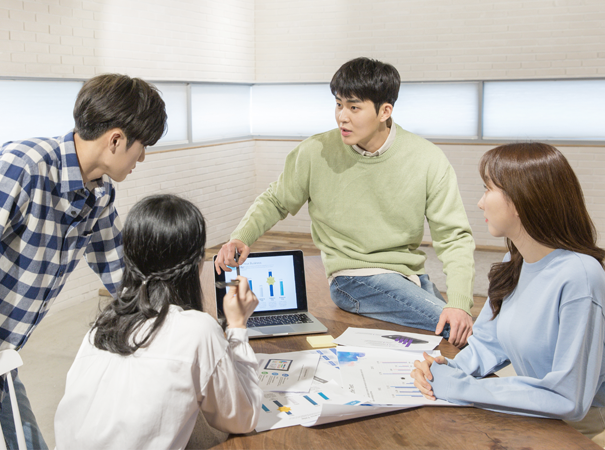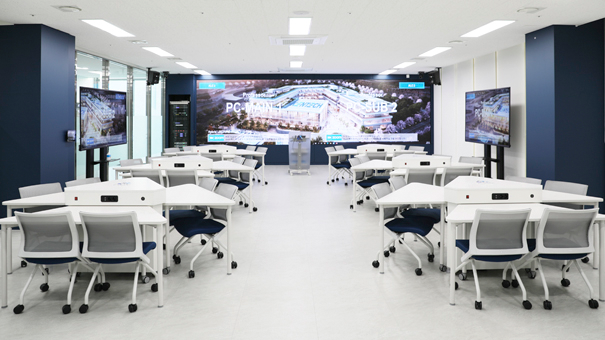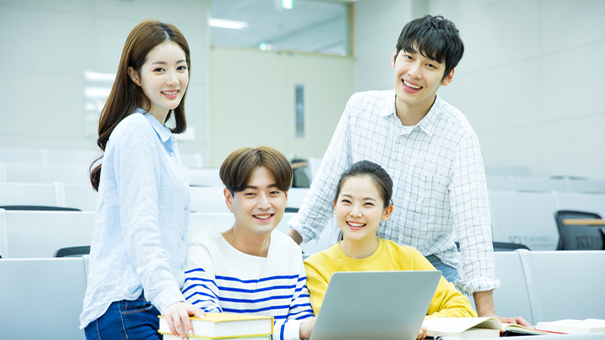eng_sub_left
Studying at KENTECH
-
Innovative Learning
Education Movie KENTECH will break down the barriers that exist between education and the real world.We will bring the working world into education and take education into the working world. We will go in-between learning and work. We will bring professionals into the classroom to teach. We will work on projects for real organizations from the beginning, and we will go out into the environment, into communities.
-
Inquiry-Based Learning
 Motivation to learn is stimulated by inquiry. Driven by questions and problems, inquiry-based learning (IBL) facilitates intellectual curiosity, engagement with complex and challenging problems, and collaboration toward their resolution. The art of questioning connects disciplinary knowledge to real-world problems. This connection is crucial in generating the motivation to learn.
Motivation to learn is stimulated by inquiry. Driven by questions and problems, inquiry-based learning (IBL) facilitates intellectual curiosity, engagement with complex and challenging problems, and collaboration toward their resolution. The art of questioning connects disciplinary knowledge to real-world problems. This connection is crucial in generating the motivation to learn.KENTECH IBL emphasizes a process of constructing new knowledge. KENTECH’s founding mission stipulates innovative and practical coursework with an emphasis on ‘usable knowledge’— connecting research to practice. As our courses and on-going research work continue to confront vexing global challenges with multi-disciplinary efforts, we require an educational approach that values and promotes collaborative working skills in meaningful contexts. We will nurture creative problem-solving skills and collaborative educational efforts through an IBL approach that will allow KENTECH’s vibrant ecosystem of innovation and entrepreneurship to flourish.
KENTECH IBL focuses on learning by doing. At KENTECH, first year undergraduate students take five high-impact energy related courses that provide hands-on, field-initiated experiences in each area, engaging them with real world research-based projects that tackle the real world challenges they will face throughout their academic careers and beyond.
IBL is woven into KENTECH’s curriculum at a range of scales. These scales include teacher facilitated structured-inquiry, teacher stimulated guided-inquiry, and move on to student formulated open-inquiry in the classroom, at the course level, and encompassing degree work. With IBL, students take increasing responsibility for their own learning in problem-based activities from entry-level courses through their capstone projects. This development of intellectual maturity takes place outside the classroom as well with learning in the residential college’s clubs and societies, service learning, and community engagement efforts.
-
KENTECH ALC (Active Learning Classroom)

This AI-based innovative learning space is specially designed to actualize student-centered, inquiry-based education at KENTECH.
Our Active Learning Classrooms are not for instructors giving lectures.ALCs are AI-based latest learning spaces, wherein our learners can maximize their learning through team projects.
-
Undergraduate & Graduate Student Experience
 Student-Centered
Student-CenteredStudent-centered curriculum is a nonauthoritative, participation-focused curriculum model. In this curriculum structure, students have opportunities and increased responsibility to identify their own learning needs: to find, choose, and incorporate resources, and to construct their own knowledge based on their needs and interests. Following this model, KENTECH encourages students to find their passions and paths in education and follow them, resulting in students’ gaining their structures of knowledge rather than simply being carriers of a standard, identical knowledge base imparted to all students. At KENTECH, students will not be encouraged to just memorize information but are led to work with and use the information they are given, both individually and with other members of the class. Speaking practically, KENTECH students have flexibility to choose courses and the course sequence that align with their interests per a semester; faculty act as coaches, mentors, and advisers, providing just-in-time instruction and helping students find the resource they need. We place students at the center of all the course design to ensure strong alignment of the course goals-activities-products-assessments (GAPA) with students’ personal needs, values, and learning contexts.
-
 Energy-Focused
Energy-FocusedStudents start energy courses from the first year that provide hands-on experiences in five core fields of energy AI, new energy materials, next-generation grid, hydrogen energy, and the environment and climate technology. Technological innovation is indispensable to secure leadership in the rapidly changing global energy market. The existing methodology focusing on knowledge transfer is not enough to respond to the paradigm shift. KENTECH will lead innovative research and education based on specialization in energy and interdisciplinary convergence. Students begin to explore the five energy fields with varying level of courses from Visionary Courses to search for their interest in each field, Energy Literacy to develop their interest in their selected field, and industry-coupled Capstone Courses to solve real-world problems in the field. Throughout the curriculum, students stay engaged by closely working on projects connected to real-world challenges. KENTECH aspires to be a global energy research hub and open platform where innovators gather together and share their achievements and resources. Students are supposed to concentrate on energy R&D and starting a business rather than job seeking.
-
Explore 5 Energy Tracks
-
Residential College

KENTECH seeks to prepare students for "personal success" and live creatively and responsibly in the world. KENTECH students need to function as responsible, reflective citizens at local, national, and global levels. KENTECH's Residential College (RC) is the foundation of KENTECH's mission to bring together and educate exceptionally outstanding students of all backgrounds. RC also allows students to experience the integration of living and learning that formal teaching, informal learning, and personal support in residences are integral to a KENTECH education.

